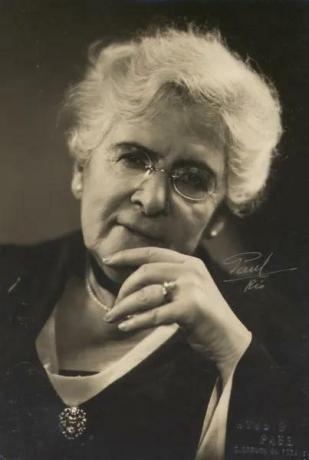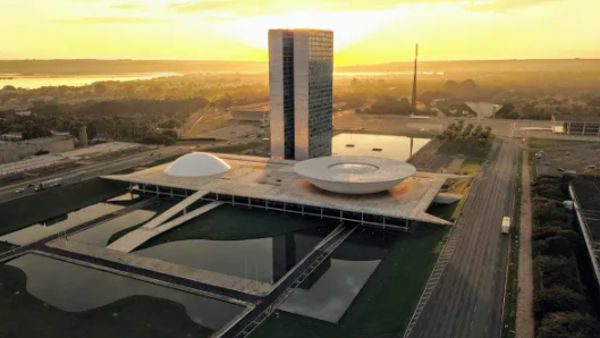Deodoro da Fonseca he was a soldier and politician regarded as one of the most important personalities in Brazil at the end of the 19th century. While in the military, he was marked by a rapid rise in the hierarchy, especially during the Paraguayan War. In the 1880s he was promoted to the rank of field marshal.
In politics, Deodoro da Fonseca was one of the characters that led to the fall of the monarchy in Brazil and the proclamation of the Republic, on November 15, 1889. Despite being a monarchist, the military was convinced to support the coup. With the fall of the monarchy, he was nominated for the presidency of the country in 1889.
See too: Luís Carlos Prestes — another military man who participated in important political moments in the history of Brazil
Topics of this article
- 1 - Summary about Deodoro da Fonseca
- 2 - Birth of Deodoro da Fonseca
- 3 - Deodoro da Fonseca's career as a soldier
-
4 - Deodoro da Fonseca and the proclamation of the republic
- → Video lesson on the proclamation of the republic
- 5 - Deodoro da Fonseca in the presidency of Brazil
- 6 - Death of Deodoro da Fonseca
Summary about Deodoro da Fonseca
Deodoro da Fonseca was born in state of alagoas, on August 5, 1827.
He was born into a family with a great military tradition, and his father and seven brothers followed this career.
He progressed quickly in the military career, especially during the period of the Paraguayan War.
He was persuaded to participate in the coup that overthrew the monarchy in 1889.
Was the first Brazilian President, and his government had two phases: provisional (1889-1891) and constitutional (1891).
Do not stop now... There's more after the publicity ;)
Birth of Deodoro da Fonseca
Manuel Deodoro da Fonseca was born on August 5, 1827, in Alagoas da Lagoa do Sul, current city of Marechal Deodoro, in the state of Alagoas. A influence of the military environment in your family she was very big, since her father, Manuel Mendes da Fonseca Galvão, was in the military, reaching the rank of lieutenant colonel in the Army. His mother was called Rosa Maria Paulina da Fonseca.
Furthermore, the brothers of Deodoro da Fonseca, just like him, all followed to same career. In 1843, he was enrolled in the Military School of Rio de Janeiro, starting his training, and, in 1847, he completed the Artillery course. even before finishinghello, already held the rank of cadet.
Deodoro da Fonseca's career as a soldier
Deodoro da Fonseca had a long career in the Army BBrazilian and participated in important events while in the military. In 1848, for example, he served in the troops that were sent to Pernambuco to repress the beach revolution, promoted by liberals due to a political dispute in that province.
In addition, Deodoro da Fonseca participated in the campaign to invade the Uruguay conducted by the Brazilian Army in 1864. This invasion was the result of Brazilian interference in Uruguayan politics to overthrow the blancos from power and install the colorados, a Uruguayan political group allied with Brazil.
The intervention had a serious consequence, which was the war in paraguay, the biggest conflict in the history of South America. In this conflict, Brazil, Argentina and Uruguay teamed up to fight the Paraguay, country that invaded the Badso thick at the end of 1864. The Paraguayan War was a turning point in Deodoro da Fonseca's career.
That's because your his actions in the conflict brought him enormous recognition and allowed him tohimgrow uprquickly in the military hierarchy. Deodoro da Fonseca was a captain when the Paraguayan War began, and was promoted several times throughout the conflict, passing through the ranks of major, lieutenant colonel and colonel.
After the war he was promoted to the rank of brigadier in 1874; and, in 1887, he became a field marshal. It is also important to mention that the marshal received honors for his performance on the battlefield. still, he held a series of important positions after returning from Paraguay.
So he took command of troops in the Rio de Janeiro; served as an inspector in the bahia; was appointed to oversee Army installations in different provinces such as Pernambuco, Rio Grande do Sull, São Paulo, Paraná It is Santa Catarina. He was also commander of arms, vice president and assumed the post of president of the province of Rio Grande do Sul in 1886. In addition, he was the first president of the Military Club.
Deodoro da Fonseca and the proclamation of the republic
One of the most important moments in the life of Deodoro da Fonseca took place in the late 1880s, when the republic was proclaimed in Brazil. He was an important part of the political and military coup that determined the overthrow of the monarchy in the country, although it was a defender of the monarchy and a friend of emperor d. Pedro II.
There was a great disagreement between the monarchy and part of Brazilian society, and a coup movement for the implantation of the republic was advancing nthe late 1880's. The Army was one of the groups that was most involved with this project of establishing the republic, as it had several demands not met by the monarchy.
In 1889, the conspiracy against the monarchy needed an influential name in the military to support it. That's why marshal Deodoro da Fonseca was convinced to jointhere due The false information, including one that he would be arrested at the behest of the head of the Ministerial Cabinet, the Viscount of Ouro Preto.
The marshal had the viscount dismissed and arrested on November 15, 1889, but did not proclaim the republic. Deodoro da Fonseca's action took place in the company of his troops. At the end of the day, political articulations led to the proclamation of the republic by councilor José do Patrocínio. The emperor d. Pedro II refused to react militarily, and the republican coup was successfully completed.
→ Video lesson on the proclamation of the republic
Deodoro da Fonseca in the presidency of Brazil
After the republican coup, the foundations of the new government were established, with the establishment of a Provisional Government. Marshal Deodoro da Fonseca was invited to assume the position of provisional president of Brazil, a role he would occupy until the republic was consolidated and a new Constitution was enacted.
O Deodoro da Fonseca government it was quite hectic, besides marked by the authoritarian attitudes of Marshal. This first moment of his government, understood as provisional, was marked by actions aimed at strengthening republican institutions and symbols.
A flag and others National symbols, in addition to toponyms, were changed with the intention of erasing any trace that referred to the monarchy. Other changes were put into practice in the country, many of them consolidated with the promulgation from the Constitution in 1891.
![Deodoro da Fonseca and other figures in his government debating the drafting of the 1891 Constitution.[1]](/f/f51ec0e134d3df69858c8e5e77b2881b.jpg)
Between the changes that took place in the country during the government of Deodoro da Fonseca, the following occurred:
separation between the State and the Church;
adoption of federalism;
adoption of universal suffrage masculine.
In addition, his government was marked by a strong economic crisis, throughout the 1890s, calledIt isnailing, during which Rui Barbosa, the finance minister, authorized private banks to issue unbacked paper money, generating a major crisis of financial speculation.
With the promulgation of Constitution of 1891, an indirect election was held, in which Deodoro da Fonseca re-electedifconstitutionally for a term that would extend until 1894. The elected vice-president was Marshal Floriano Peixoto.
This second phase of the Deodoro da Fonseca government is called constitutional, being the moment when the president's friction with the Legislative increaseplow quite. This is because the president did not accept governing in accordance with the principle of the Three Powers and did not want to deal with interference from the Legislature.
The president's crisis with the Legislature led him to take increasingly authoritarian measures, until decided to close the National Congress in November 1891. A political crisis settled in the country, with civil resistance and a military rebellion against the president. Part of Mainha rebelled and threatened to attack Rio de Janeiro if he did not resign.
The pressure on Deodoro da Fonseca worked, and he, fearing the start of a war civil, resigned à presidency of Brazil in 1891, on the 23rd of November. His deputy, Floriano Peixoto, took office, governing the country until 1894.
Know more:Getúlio Vargas — another president of Brazil who ruled both provisionally and constitutionally
Death of Deodoro da Fonseca
After the presidency, Deodoro da Fonseca's health deteriorated terribly, and he died on August 23, 1892, in Rio de Janeiro. His burial had all the military honors, being buried in the city of Rio de Janeiro, capital of Brazil at the time.
image credit
[1] Wikimedia Commons (reproduction)
By Daniel Neves
History teacher
Access to know who was and the importance of Benjamin Constant. See how he acted in the proclamation of the Republic in 1889.
Click and learn more about the 1891 Constitution. Discover the context of its elaboration and its main characteristics.
Click on the link and see details of d's life. Pedro II, Emperor of Brazil for nearly half a century. Check out information about his reign and his personal life.
See the main events that marked the government of Deodoro da Fonseca, the first president of Brazil. Understand the context of the time and the end of this government!
Click and learn more about the government of the second president in Brazilian history: Floriano Peixoto. See the main events of this troubled period.
Understand the main events of the Paraguayan War, fought between 1864 and 1870 and considered the greatest in the history of South America.
Access for details about the Proclamation of the Republic. Understand the monarchy crisis process and see which groups were most dissatisfied.
Click and access to find out more details about the Praieira Revolution. Understand what motivated the beginning of this uprising and how it ended.



